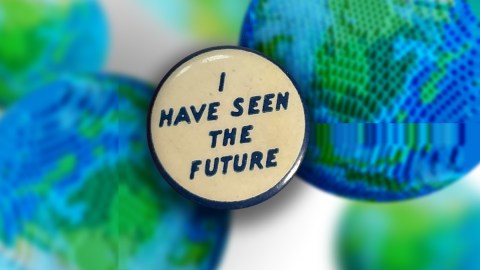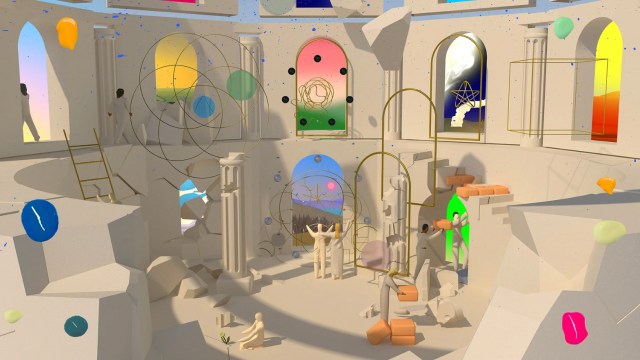What’s the role of optimism in creating the future?

There’s a wonderful (but perhaps wonderfully apocryphal) quote from the legendary science fiction writer William Gibson that goes, “The future is already here—it’s just not very evenly distributed“.
It’s a perspective that has animated our newsroom since we first launched. As a media company focused on covering the frontiers of change — the people and ideas that are remaking the world — we are obsessed with always searching for the widest possible lens through which to spot those vibrant frontiers where change is happening that could have implications for the rest of the world in the near term.
A necessary prerequisite for that work is a belief in people and a sense that the world is an exciting place full of new possibilities. The economist Max Roser from the University of Oxford captured this beautifully with this formulation: “The world is awful. The world is much better. The world can be much better.” Without a doubt, the world is broken. We consistently fall short of our collective ideals. And yet, we know the world has gotten dramatically better and while history reminds us that progress is not inevitable it shows that we can take action to make a better world.
It’s a simple enough idea but one that seems increasingly out of vogue in a world where cynicism has become a hollow shorthand for intelligence. Afraid of being labeled naive, too often our discourse is characterized by hostile, knee-jerk skepticism that doesn’t allow much room for doubt or wonder.
This cultural moment is part of what animated my interest in exploring progress for our inaugural special issue. What is the role of optimism in making progress happen? And how do we balance the capacity to imagine with our responsibility to the urgent present?
Throughout this package of interviews and essays we try and get our collective heads around those questions—how progress happens, how we nurture it and how we stifle it, and what changes are required in how we approach our most serious challenges to ensure greater progress for all.
We set out to explore four main questions:
- How do we define progress?
- Is it possible to sustain the phenomenal (and relatively recent in the context of human history) progress we have experienced?
- What should we make of the pervasive sense of pessimism that seems to define our current zeitgeist and how does this impact our ability to continue to drive progress?
- And finally, how can we make sense of the future and better focus our efforts to drive greater progress for the world?
Towards that goal, we spoke with economist Tyler Cowen who, along with Patrick Collison, penned an influential essay in The Atlantic a few years ago calling for “a more focused, explicit study of progress” and kicked off an exciting new discipline of “progress studies” to interrogate many of these same questions. He spoke with us about why American progress has seemed to stall and how we can get it back on track.
Dr. Hannah Ritchie of Our World in Data explores the ways that our overwrought pessimism in this moment is driving us crazy and obscuring the real potential we have to make progress and we sat down with the filmmakers of the new documentary “We Are As Gods” about the fascinating career of the iconic Stewart Brand and unpacked his uncanny ability to catalyze community and create culture through powerful iconography from the early days of the environmental movement to the early days of Silicon Valley.
From there, Jason Crawford issues a thoughtful call-to-action to reject the naive optimism of the past and forge a “renewed vision of the future: a bold, ambitious, technological future, one that we want to live in and are inspired to create.”
In order to understand what that renewed vision might look like I spoke with nearly a dozen experts to unpack what they see as the biggest challenges we face and their prescriptions for how to address them. The result was a fascinating and wide-ranging conversation including New York Times bestselling author Rutger Bregman sharing anecdotes from history to underscore the the importance of “expanding our moral circle of concern” to international lawyer and New America CEO Anne-Marie Slaughter grappling with the idea that we “never get to [fully] achieve our ideals” and why that recognition is key to making realistic and achievable goals to Charles Kenny of the Center for Global Development making the case for expanding opportunity in order to give the world’s nearly “eight billion potential Einsteins” a chance to achieve their full potential.
I was particularly delighted to collaborate with the authors of the iconic article The Long Boom: A History of the Future, 1980-2020 which was published 25 years ago this year in WIRED magazine. The article predicted with eerie accuracy the sustained moment of technological progress we’ve enjoyed over the past few decades. One of the authors, Peter Leyden, reprises his role as techno-optimist soothsayer reflecting back on the legacy and impact of the original Long Boom piece and making intriguing predictions about what the next 20 years could bring. Meanwhile, we sat down with the other original Long Boom co-author, Peter Schwartz, to share advice from his fascinating career as a futurist which has ranged from advising Fortune 500 companies to consulting on movies like Minority Report to paint a picture of—and even help inspire—the future.
To wrap up the issue, WIRED Magazine Founding Editor Kevin Kelly attempts to reframe our focus away from utopia to a more gradual (and therefore eminently more achievable) goal of a “protopia” while Longpath’s Ari Wallach urges us to think bigger picture and longer term and challenges us to make investments that will leave a lasting legacy for future generations.
As Jason mentions in his essay, the theme of the 1939 World’s Fair was “The World of Tomorrow” and attendees received buttons after visiting a popular attraction emblazoned with the words “I have seen the future.” A small token expressing such a romantic and inspiring idea.
My humble hope is that as you explore this special issue you will also feel that—in some small way—you too have seen the future. And I hope that it encourages you to keep looking for it, right alongside us.
This inaugural special issue has been a real labor of love from colleagues across our team. I’m excited to share it with our amazing readers and look forward to hearing from you!





